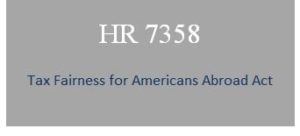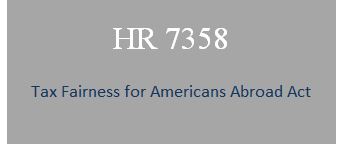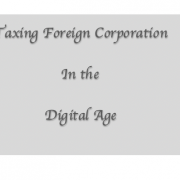Residency Based Taxation Legislation Provides False Hope for U.S. Expats
 Citizen Based Taxation
Citizen Based Taxation
The origins of citizen based taxation can be traced back to the Civil War and the government’s struggle to raise revenue for the war effort. The predicate for imposing such a system was based upon the notion that Americans living outside of the United States were shirking their duties to America during a crisis. As a consequence, in 1861 the Government imposed an income tax on expats. This tax that was higher than the rate charged to the Americans who resided in the United States.
The law was subsequently reformed and beginning in 1864, nonresident citizens paid the same rate as citizens residing in the United States. In exchange for equalizing the tax rates, nonresident citizens were now required to pay income tax on their worldwide income.
The rationale for imposing citizen based taxation was predicated upon a sense of duty and community membership, sentiments that carried over from the Civil War. In 1924 the Supreme Court decided that citizen based taxation was constitutional (Cook v. Tait, 265 U.S. 47 (1924). However, instead of relying on sense of duty and community membership, the Court appeared to rely upon the inherent benefits associated with becoming a U.S. citizen, but failed to detail the benefits. Presumably, these benefits include: the right to return to the United States, the ability to participate in the American economic and social community, and the right to access U.S. Courts for redress and the right to vote.
Over the years, efforts to mitigate the impact of citizen based taxation on non-resident citizens have included the implementation of the foreign tax credit in 1918 and the foreign earned income exclusion in 1926.
Tax Fairness for Americans Abroad
U.S. expats have been lobbying for years seeking to change the current U.S. citizen based taxation system to a residency based system. In December of 2018, Republican Congressman Holding introduced a bill entitled: “Tax Fairness for Americans Abroad Act” (H.R. 7358). This bill proposes a transition from citizen based taxation system to a system that is based upon residency. The bill would amend I.R.C. Section 911 by adding a Section 911A designated as “ALTERNATIVE FOR NON-RESIDENT CITIZENS OF THE UNITED STATES LIVING ABROAD” (Id. at Pg. 2).
With the introduction of this legislation in Congress, many expats, practitioners and other observers are overjoyed at the prospect of ending the citizen based taxation, which taxes U.S. Citizens and its legal residents on their worldwide income. However, I do not believe the change will occur, at least, for the foreseeable future.
Reasons that will hinder the change in the current IRS Tax based system
The proposed amendment provides qualified non-resident citizens of the United States, who elect to be taxed as nonresident citizens, with exclusion for foreign earned income as well as foreign unearned income for U.S. tax purposes. Alternatively, an Individual can elect to continue to be taxed based upon the current citizen based system.
In addition, qualified non-resident citizens would be allowed to exclude unearned income (Gains) associated with the “sale of personal property to the extent such income is attributable to periods during which the individual was a qualified nonresident citizen. Id. at Pg. 3. Similarly, HR 7358 would amend I.R.C. Section 7701(b) by adding a new definition for the term “Nonresident Citizen.” To be considered a non-resident citizen in a given tax year an individual must: (i) be a citizen of the United States; (ii) have a tax home in a foreign country; and (iii) must otherwise be in compliance with the U.S. tax laws for the previous 3 years.
Similarly, the individual must establish that he or she has been a bona fide resident of a foreign country or countries for an uninterrupted period of one year or alternatively meet the physical presence test which requires that an individual be present in one or more foreign countries for a minimum of 330 days during the tax year. The amendment excludes Federal Employees from the definition of nonresident citizen.
It is also important to note that the prospects for passing such legislation are slim based upon the history of citizen based taxation, the Government’s investment in financial reporting, FATCA, Bank Secrecy Act, concurrent FBAR filing requirements and the political climate in DC.
One could also argue that, the proposed bill undermines the integrity of FATCA and other IRS global tax enforcement initiatives designed to ferret out overseas tax cheats.
Perhaps the most significant reason HR 7358 will fail is the upcoming presidential election in 2020. It is highly unlikely that bipartisan support for HR 7358 could be achieved in the foreseeable future, given the current legislative climate in DC. The logic is clear. The passage of any bill introduced by a Republican would be considered a victory for the President Trump. Consequently, democrats will never get on board.
Furthermore, there are no signs that the congressional stalemate will subside following the presidential election. Quite the contrary. Political commentators predict more of the same, irrespective of who is in the White house and whether the Republicans regain control of the House of Representatives. If Trump is reelected, more investigations will certainly follow. Even if the Republicans somehow are able to regain the majority in the House, there is no certainty that anything will be accomplished. Remember! “Repeal and Replace Obamacare.”
While politicians and expats alike may consider HR 7348 promising, I am reluctant to pop the cork just yet. We will just have to wait and see. Expats who meet the filing threshold will still be required to file FinCEN Form 114 (FBAR) with respect their Foreign Financial Accounts.






